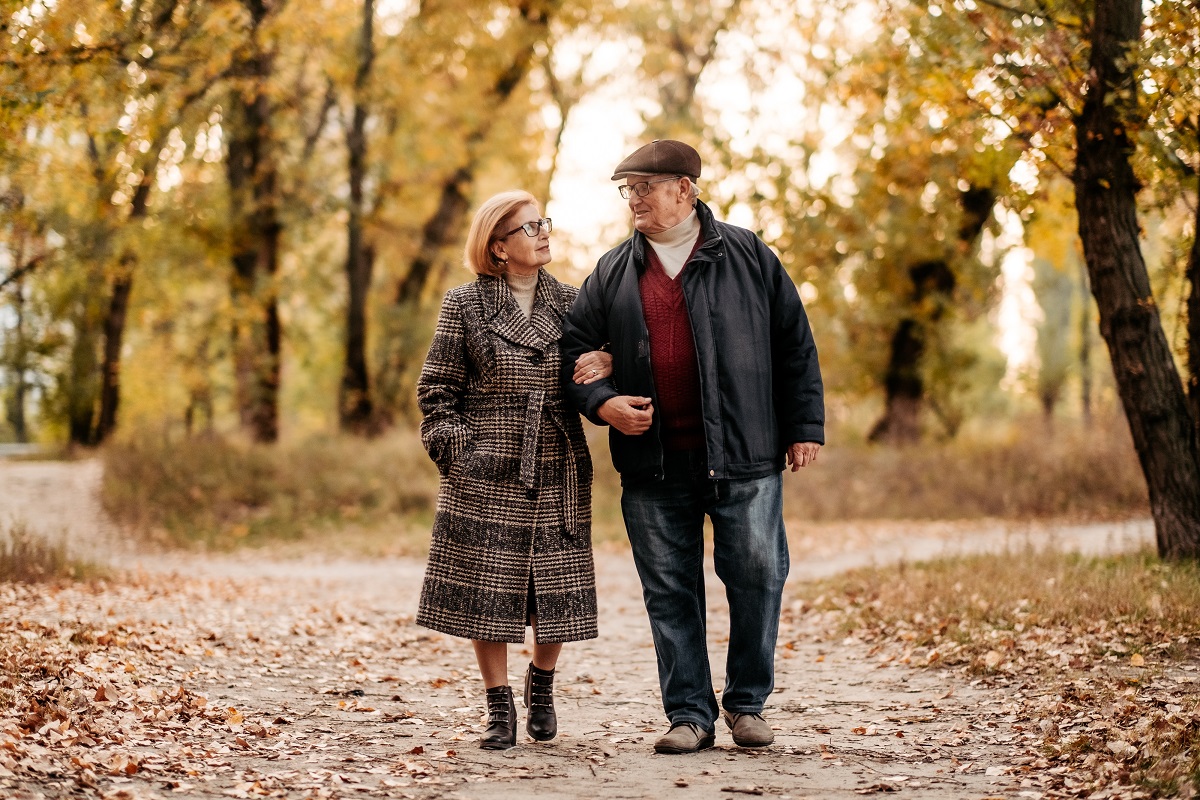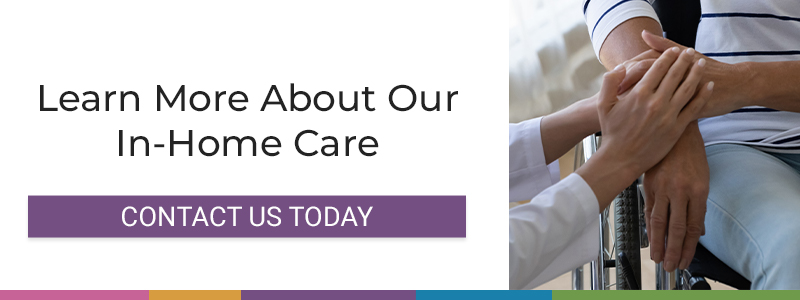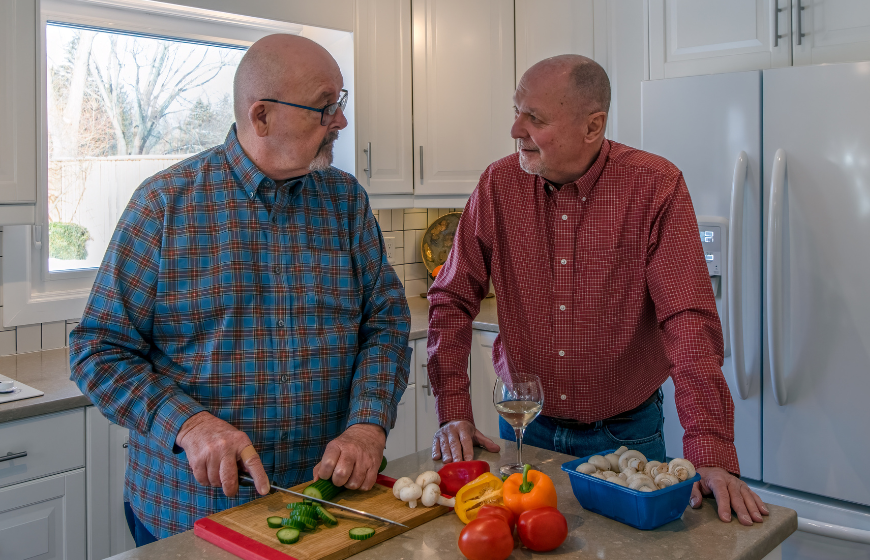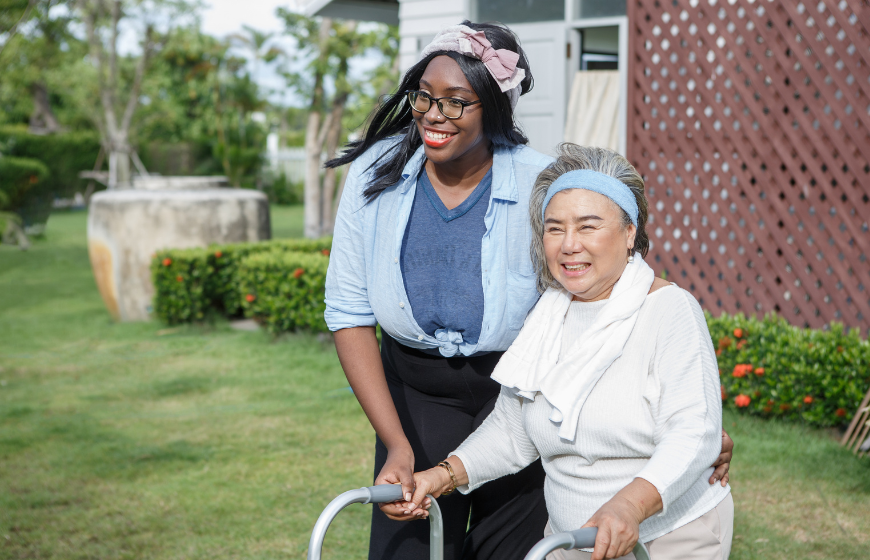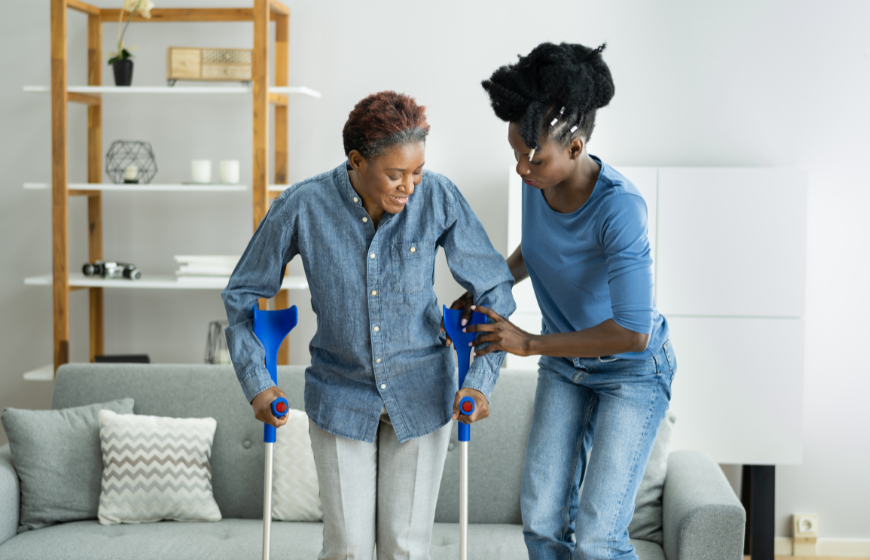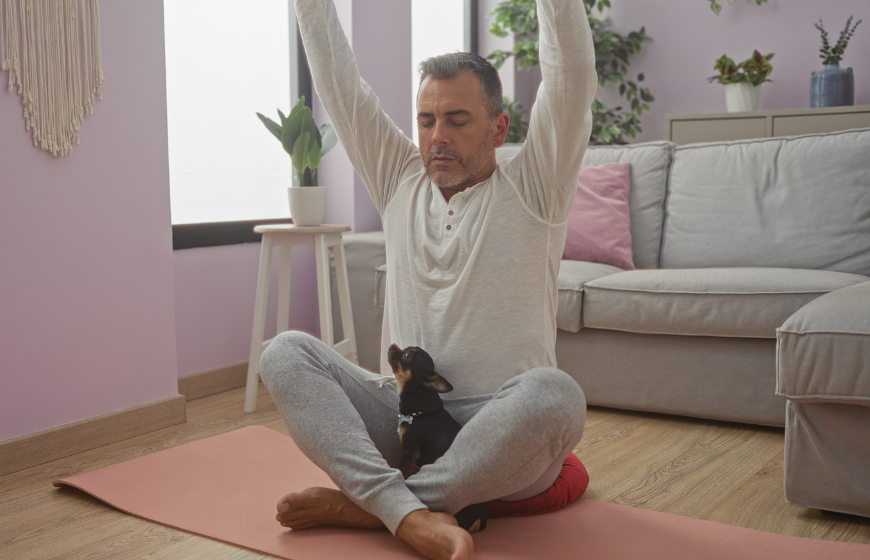Whether your loved one has experienced a fall in the past or you’re worried about their potential for falling after a dementia diagnosis, the thought of a senior in your life taking a potentially life-threatening fall can be incredibly stressful.
Dementia and falls are, unfortunately, correlated according to numerous medical studies.1
In this article, we’ll discuss how and why dementia symptoms and treatment can lead to falls in seniors, and answer some crucial questions, including: “Can a fall accelerate dementia symptoms?” and “What dementia-related symptoms or treatments lead to falls?”
As you read this article, remember: frequent falls or recurrent falls with dementia aren’t guaranteed—you and your home medical assistance team can keep your loved one safe and prevent falls before, during, and after their dementia diagnosis.
Dementia and Falls: The Evidence
In 2014, the Centers for Disease Control and Prevention (CDC) estimated that there were five million older adults over 65 living with dementia in the US.2
While scientists are still researching the specific causes of the older people’s memory loss and other dementia symptoms, they’ve determined—via numerous peer-reviewed medical studies—that dementia symptoms can increase the likelihood of falls in senior patients.3
Reasons for falls in elderly dementia patients can generally be placed into one of two categories:
- Intrinsic risk factors – Intrinsic risk factors are added risks for falls due to an elderly person’s mental wellbeing, dementia symptoms, and physical factors (such as age, weight, or muscle mass). Intrinsic risk factors can be treated in some cases, but aren’t always avoidable.
- Extrinsic risk factors – Extrinsic risk factors are elements that an elderly person encounters in their environment, medications they take to treat their disease or symptoms, or equipment that they use to complete everyday functions (like walkers, wheelchairs, or verbal aids).
In the following section, we’ll discuss numerous extrinsic and intrinsic factors that can lead to increased fall risk factor for a dementia patient.
Dementia-Related Falls: Common Causes
While factors like full-time supervision and quality in home nurse care can help in reducing fall accidents in older adults, some risks are unavoidable. While reading about the common causes of dementia-related falls, remember that it’s critical to address as many risk factors as you can to keep your loved one safe.3
#1 Disorientation While Walking
One of the most common symptoms of vascular dementia is increased likelihood of disorientation. What does that look like in real time? Your loved one might experience one or more of the following disorientation effects before, during, or after their dementia diagnosis:2
- Getting lost or losing track of time in a familiar neighborhood, park, or indoor area
- Forgetting names, places, or basic directions
- Losing track of a task in progress
- Referring to previously-known people and objects by strange or unfamiliar names
Unfortunately, a common response to disorientation is panic. Even if the older person is safe at home, they may suddenly forget what they were working on, where they are, or where they were intending to walk in their home. This can lead to panic or fear, which may cause erratic movements in an attempt to protect themselves and regain stability. However, unpredictable movements, especially in unfamiliar environments, can cause falls.
#2 Overloading
When we’re young, it’s relatively easy to climb a flight of stairs, balance on one leg, or unlock a door with an armful of groceries. However, minor to severe muscle or mobility loss in older years is normal. This means elderly people will find themselves less able to complete semi-risky, balance- and strength-related tasks like this as they get older.
People with memory loss or time-related disorientation—like dementia patients—may easily forget that they’re not as strong, flexible, or agile as they used to be. This means your loved one may not remember that they have reduced physical capabilities and may attempt to overload themselves with objects that are simply too heavy for them to carry all at once.
Overloading can lead to loss of balance, dropped objects, or reduced situational awareness, all of which can cause a fall.
#3 Loss of Balance
Reduced balance is a symptom of dementia, and while it might seem clear that this could lead to a fall, doctors have confirmed this correlation in multiple studies.1
Think of all of the scenarios where balance is critical to daily function:
- Steadily walking at a normal pace
- Standing and sitting
- Climbing into a shower or bathtub
- Maneuvering to reach for hygiene products while in the shower or on the toilet
- Getting into the passenger seat of a car
- Reaching up for an object on a high shelf and pulling it down with one arm
- Climbing stairs or crossing elevation changes, like door thresholds or porch steps
Like many everyday functions, balance is physical, mental, and chemical. How so?
- Physical – Maintaining muscle mass (especially in your core) can improve your balance and increase your ability to regain stability after a stumble.
- Mental – If your loved one has fallen in the past, they may have decreased confidence, even in everyday movements.
- Chemical – Numerous brain and inner ear functions contribute to balance control.
With so many factors involved in maintaining good balance, it can be difficult to identify and mitigate the balance risks your loved one with dementia may experience.
#4 Changes in Gait
As a result of dementia-related disorientation or reduced mobility in old age, a senior loved one’s gait will likely change over time. You might observe sudden or gradual changes to a loved one’s walking pattern in one or more of the following areas:1
- The length of their stride
- Their strike pattern (for instance, changing from heel-toe strikes to toe-heel strikes)
- Their walking speed
- Their dependence on informal mobility aids, like walls, chair backs, or furniture
Your loved one may not expect these changes, especially if they experience reduced cognitive function and memory function associated with dementia. Like disorientation, sudden changes in gait patterns could easily confuse or scare seniors with dementia, potentially causing a loss of footing and a fall.
Medical experts have also correlated increased use of formal walking aids (like walkers, canes, and wheelchairs) with increased fall risks, along with participation in outdoor walks.
#5 Previous Falls
Unfortunately, a fall in your loved one’s past could lead to a fall in the future. While we touched on reduced confidence after a fall in the section about loss of balance, there are a few other impacts of a previous fall that could increase your loved one’s risk of another slip:3
- Reduced strength – After a fall in old age, your loved one may have sustained major injuries, like bone breaks or fractures. While injuries in old age can have a lifelong impact on mobility, their recovery time may also reduce their strength, especially if the senior in your life was particularly active before their fall.
- Unfamiliar reductions in muscle, joint, or bone function – As we discussed in the overloading section, a dementia patient with memory issues may not remember that they’ve lost muscle mass, joint function, bone strength, or balance as a result of a previous fall. Thus, rediscovering their reduced function may surprise, disorient, or scare them, all of which could cause another fall.
- Mobility aids – Medical experts have correlated the use of walking aids with increased risk for falls. If your loved one was prescribed a mobility aid after their last fall, learning to use the aid correctly and confidently may cause trips and falls at first.
One way that can help slow down the symptoms of dementia is engaging in physical activities like wheelchair exercises for seniors. 4
#6 Attention-Seeking Behavior
In some dementia patients, loss of memory, decreased social skills and awareness, and prolonged language or cognitive impairment—especially impairments that prevent their loved ones and friends from understanding them—can lead to attention-seeking behavior.1
Attention-seeking behavior is one of a few psychosocial symptoms and comorbidities of a dementia patient that can lead to increased fall risk, along with:
- Verbal or physical disruptiveness, especially when patients can no longer speak
- Generalized anxiety or anxious behaviors like pacing
- Higher than average impulsivity
All four of these behaviors can lead to risky movements, which can cause falls in some cases. If your loved one often acts out in an attempt to be heard or understood, consider speaking with their doctor about cognitive behavioral strategies that you and your dementia care team can use at home.
One of the benefits of home care is that your loved ones can pursue physical and mental health improvements without having to leave the house.
#7 Medication Side Effects
Some medications can decrease cognitive awareness, increase drowsiness, or cause physical instability. Dementia medications often impact the central nervous system, and these treatments can have side effects that could cause a fall.1
Before adding any new medications or modifying existing medications in your loved one’s pharmaceutical regimen, ask their doctor about any potential side effects that could increase their risk for a fall. Their doctor may decide that a different medication is more appropriate and less risky, or that medication side effects aren’t worth the fall risk.
Preventing Dementia-Related Falls with High-Quality In Home Care
Unfortunately, doctors have determined that dementia and falls are correlated, meaning that your loved one with dementia is more likely to experience a fall due to their unique symptoms. However, by identifying and addressing the above risk factors for falls, you can protect your loved one from a potentially fatal injury and ensure their long-term physical comfort.
Risk mitigation in an elderly loved one’s home can be a lot for one person to handle. Fortunately, if you’re the sole caretaker of an elderly loved one, you don’t have to go it alone.
At Alliance Homecare, we provide highly trained, compassionate, and expert caregivers when your family needs them most. Whether your loved one is recovering from a fall or learning to manage new symptoms of dementia, we’re here to take some of the caretaking weight off of your shoulders.
When you and your loved ones need a helping hand, look no further than Alliance Homecare’s team of in home health experts.
Sources:
- National Library of Medicine. Risk Factors Associated with Falls in Older Adults with Dementia: A Systematic Review. https://www.ncbi.nlm.nih.gov/pmc/articles/PMC5435396/
- Centers for Disease Control and Prevention. What Is Dementia? https://www.cdc.gov/aging/dementia/index.html
- National Institute on Aging. Prevent Falls and Fractures. https://www.nia.nih.gov/health/prevent-falls-and-fractures
- Dementia. Physical exercise and dementia. https://www.dementia.org.au/sites/default/files/helpsheets/Helpsheet-DementiaQandA08-PhysicalExercise_english.pdf
